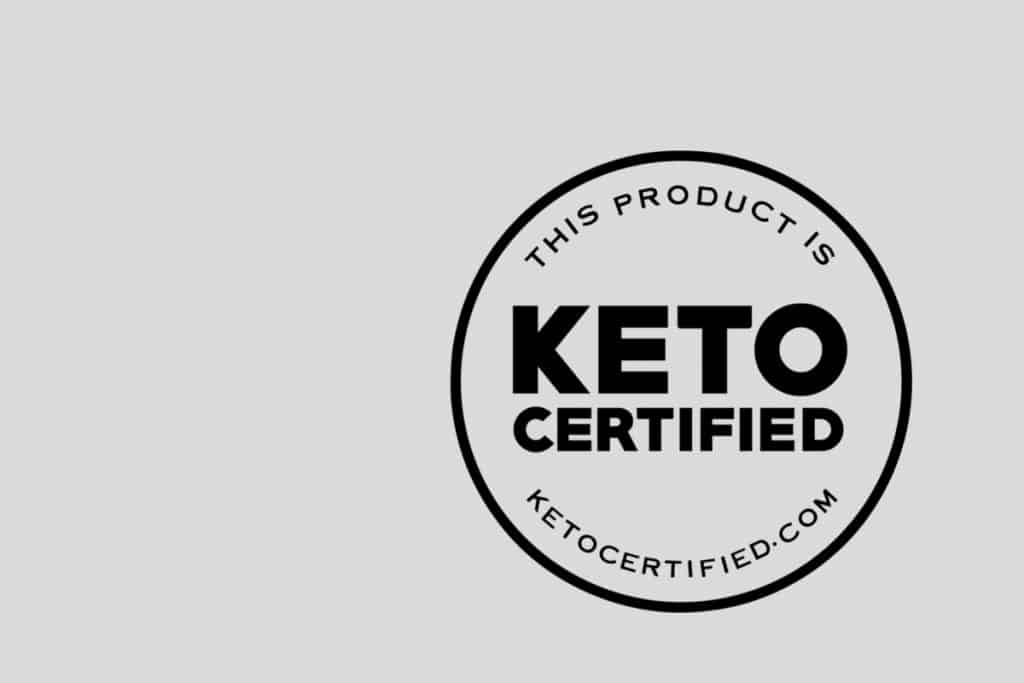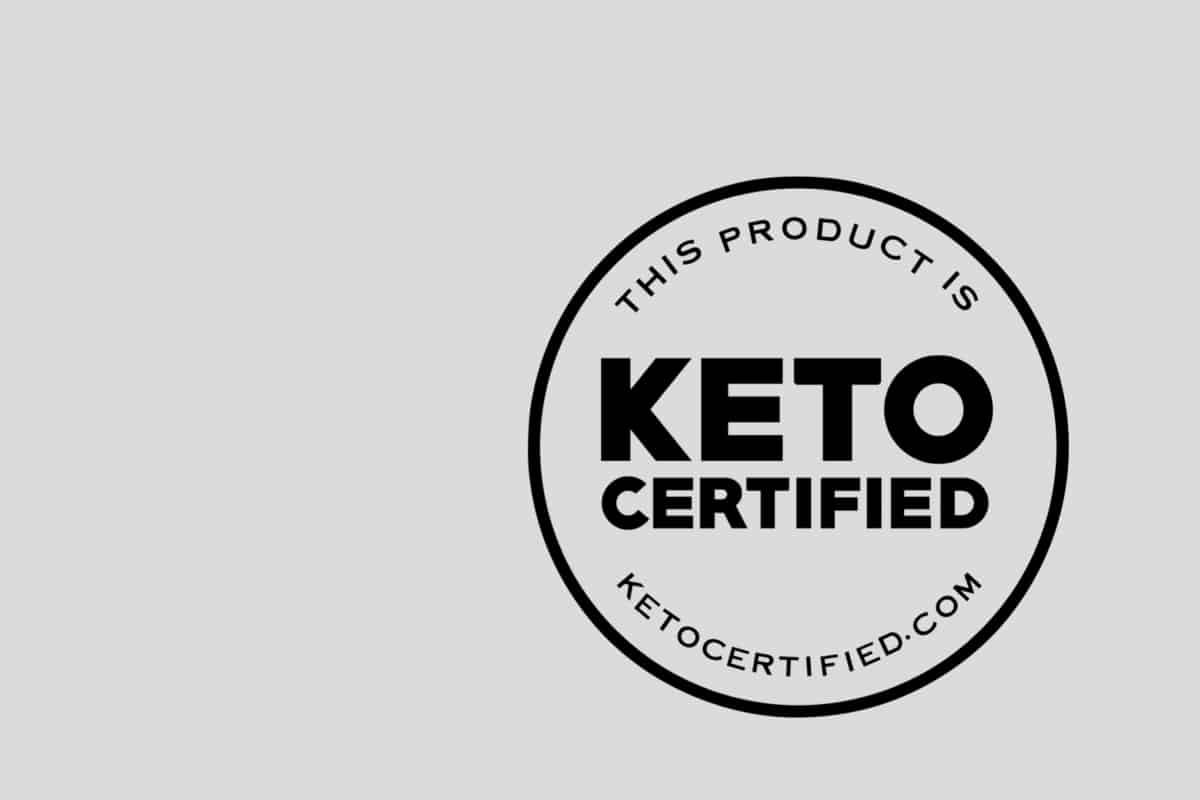There are a great many labels on most foods now, from “gluten-free” to “free-range” and “keto certified”. All of these labels may appear to make the product safe or good for a specific reason, but this isn’t the entire story and quite frequently the requirements for these labels is more about money than about health and food quality and customer knowledge.
What Does “Keto Certified” Mean On Product Labels? The “Keto Certified” labeling is trademarked by the Paleo Foundation. The only way to use it is to enter into a contractual agreement with The Paleo Foundation Inc. It means you must pay them to have the logo on your product and they can review at any time.
Let’s dive into labels and what they were intended for and how they are currently used. We will dig into why they mean less than expected for the consumer and more about marketing you a product.
What Is The “Keto Certified” Label For?
The thought behind a “Keto Certified” label is awesome in concept and could have been used to help out the less knowledgeable consumer in making food choices.
It could have helped to signify what foods were going to help keep you satisfied while having lower caloric values helping to establish a fat loss conceptually.
Unfortunately, in this case, it appears it is more to find corporate supplementation of funding. The version of “keto” they describe is more along the lines of medical ketosis instead of being intended for the weight loss that most people are striving to achieve.
Visit the Keto Certified website to learn more about the certification process. Please don’t believe the “food consciousness” they claim, per the quote from their application site, it is only about building sales through consumer trust.
Studies suggest that certification is the most impactful way high-quality brands can differentiate their products and positively impact trust. Congratulations on taking your first active step towards increasing brand trust and sales by completing your third-party Keto Certification Application for your products.
Keto Certified Application
Speeding Up The Regulatory Process
Another large reason why a company will give someone the cash to “certify” the product is in the following quote from the certification reasons part of the Paleo Foundation which reads:
With certification from the Paleo Foundation, “Paleo” “Grain-Free” and “Keto” claims are considered more “consumer-friendly”, “compliant”, and “transparent” by USDA or FDA regulators, potentially saving you time and a world of frustration.
Paleo Foundation – Why Get Certified?

How Much Does A “Keto Certified” Label Cost?
The starting “fee” for a year of branding is $3,000 if you only sell less than $100,000 in products. This escalates up to $10,000 is you were to sell more than $50 million in product.
This means the certification is heavily weighted towards the biggest corporations and companies as the cost scales farther down with the more sales you have.
The biggest red flag is that it is the Paleo Foundation who started the “keto certification” while the paleo fad slowly has faded.
The fact that the fees are structured to benefit the high sales side corporations instead of the small businesses shows that this is aimed more at the building of brand loyalty and getting your purchase based on an assumption of healthy “certified” choices.
What Does The Paleo Foundation Measure For Certification?
There is importance to understanding what is used to provide certification as it can tell you a lot about the goods they will let pass into the store featuring the label for your trust.
Their stated purpose is to stand in adherence with a “classical ketogenic diet” which means not a “fat loss ketogenic diet” so you need to keep that in mind.
The Keto Certified label was developed and trademarked by The Paleo Foundation Inc. to identify food products that meet the standards of the Ketogenic Diet. The Keto Certified Label is a certification mark and its use is only permitted by those who have entered into a contractual agreement with The Paleo Foundation Inc.
The Keto Certified Label was designed to establish an easily identifiable mark indicating that a product has met the strictures of the Ketogenic Diet and merit use of the Keto Certified Label.
Keto Certified Approach Is To “Tolerability”
This is an interesting point to understand that the aim is towards a “classical ketogenic” read “medical ketogenic” diet. This means an aim towards higher fat in the realm of 70% of total calories.
They are aiming to make it more simple and convenient to eat a ketogenic diet which isn’t a bad thing. Unfortunately while trying to establish yourself as a “voice of reason” at the same time definitely borders on worrisome as you may bend your “approval” on factors other than food quality.
Keto Certified products are in a unique position to improve tolerability of the ketogenic diet as they each improve factors of palatability, convenience, and availability. This is especially true in social and cultural environments that typically feature carbohydrate-rich “special occasion” types of foods. Thus, the importance of product producers in improving tolerability of the Ketogenic Diet can never be overstated.
Keto Certified Standards For Carbohydrate Content
The basic explanation is based on the net or “effective” carbohydrate count per serving based on the item of food. While this can be true for vegetables it is argued hotly whether added fibers into foods can truly have no reaction in the body. Read more on the truth about net carbohydrates from Dr. Rusin here.
- MEALS / MEAL REPLACEMENTS – <10-12g PER SERVING
- SNACKS – <6-8g PER SERVING
- SEASONINGS – <6-7g PER SERVING
While labeling allows for companies to list “net” carbohydrate it has been shown that many people still experience issues with sugar cravings and bodily responses to these carbohydrates. The fact that most Ketogenic diets limit the carbs, even “net carbs, to 20g means that they allow you to eat 2 meals or less at the rated 10-12g per meal which is “acceptable”.
Keto Certified Standards For Allowed Ingredients
- Meats and Seafood
- Fruits and Vegetables
- Nuts And Seeds
- Dairy
- Protein
- Milks
- Oils and Fats
- Flavors and Coloring
- Sweeteners
- Supplements
- Chocolate
- Coffee and Teas
- Stabilizers and Emulsifiers
- Spices
Exogenous Ketone Acceptance
While exogenous ketones are listed on the disallowed list currently they are allowed depending on how they are derived. Naturally derived ketones like beta-hydroxybutyrate (BHB) mineral salts, and MCT is allowed to be in the foods that are certified.
What isn’t allowed is ketone esters as there is a limited amount of research on their safety for use. If interested H.V.M.N. has a listing of studies which are all around ketone esters for more self-research. For example, this is an interesting one on Intake of a Ketone Ester Drink during Recovery from Exercise Promotes mTORC1 Signaling.
Keto Certified Standards For Disallowed Ingredients
The list is pretty solid on what they won’t allow in ketogenic foods, I won’t argue their choices are pretty solid from a health standpoint. Removing most oils which aren’t from natural sources and artificial flavors and sweeteners is a good step towards solid fundamentals of bad ingredients.
- Partially-Hydrogenated Oils
- Including soybean, margarine, and vegetable oils
- Artificial Flavors
- Exogenous Ketones
- Due to not enough clinically relevant safety studies not that they aren’t sound in a ketogenic diet
- Sweeteners
- Includes things like corn syrup, artificial sweeteners such as saccharin, cyclamate, acesulfame, aspartame, and sucralose
Download The Keto Standards To Learn More
How Long Does It Take For Keto Certified Status?
The website has an official length of 6-8 weeks based more around the company sending over all of the appropriate information and details. They do also provide higher cost “expedited” services at a premium ranging around $2000 for a 2-day certification.
This is where I start to worry that this is not at all about being helpful to a consumer. This is a large scale ploy on the public by another company to help get other companies “certified” so they can sell goods at a premium price tag with a label aimed at influencing underinformed purchasers.
Ketogenic Hero
Final Thought on What Does Keto Certified Mean
Labels are labels, nutrition labels are lawfully allowed to be incorrect and are allowed to be off from the listed content by a higher margin (up to 20% off stated numbers!) then most people are led to believe.
Relying on the packaging to tell you what you should eat is a plan for failure, while at the same time counting your caloric intake is the easiest way to lose body fat.
I just want to make sure there is a level of understanding on why you need to be skeptical of food labeling and the processes that allow people to list bacon as “gluten-free”. This labeling is to make you purchase a product that has no “gluten-filled” version available.
Work your hardest to eat local foods from local farmers, find a farmers market and get real grass-fed products like ButcherBox, these meats will typically be smaller in size than the supermarket but have ALL of the nutrients which makes you satisfied with less needing to be consumed.
Supporting local farmers produce will also keep them in the business of making healthy animals and keep them away from candy feeding and similar.




